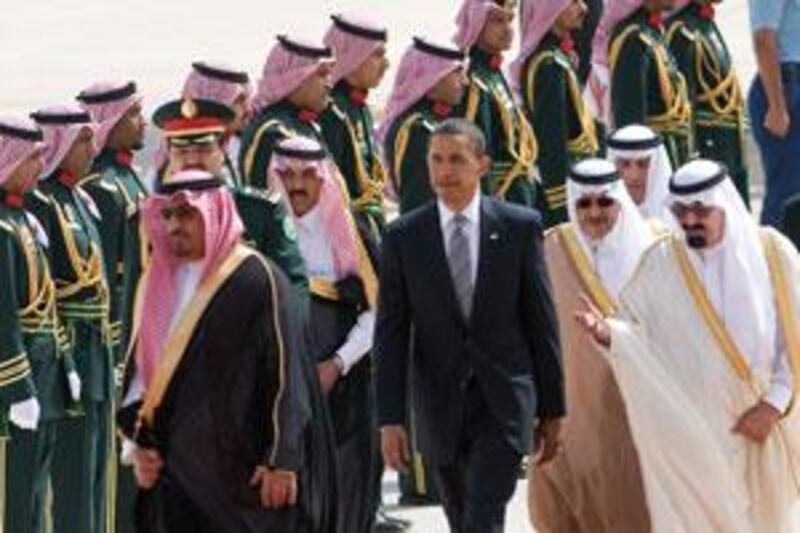CAIRO // If the US president wants to "change the conversation" between the United States and Arab Muslims when he steps up to the podium in the Egyptian capital today, there is perhaps no better - or more critical - place to start than with the looming crisis facing the region's 100 million youth. As the region belatedly comes to grip with the economic and social costs posed by the global economic downturn, championing the cause of youth as a symbol of the region's best hope is, to put it colloquially, a no-brainer for Barack Obama, said Tarik Yousef, the dean of the Dubai School of Government.
"A lot of people would take issue with talk of promoting democracy, but taking on the challenge of bettering the lives of young men and women in the Arab Muslim world? Nobody would disagree," Mr Yousef said. The future prospects of young people in the Middle East were already in jeopardy before the recent downturn. Most universities and colleges were failing to prepare students for jobs in an increasingly globalised economy, Mr Yousef and other policy experts said.
In turn, youth in record-high numbers either were not working or were taking jobs that failed to meet their high, sometimes unrealistic, expectations. Lacking the critical accumulation of cash, many were forced to put off marriage and having families. With unemployment for those between the ages of 15 and 24 already at 25 per cent, the recession only threatens to make matters in the region worse, says a report issued last month by the Middle East Youth Initiative, a joint project of the Dubai School of Government and the Wolfensohn Center for Development at the Brookings Institution in Washington.
"The global economic slowdown could ignite a new jobs crisis in the Middle East," warns the study, Missed by the Boom, Hurt by the Bust: Making Markets Work for Young People in the Middle East. Nowhere perhaps are these challenges to Muslim youth more starkly evident than here in the Egyptian capital, the metropolis of the Arab world and, with its 18 million people, the largest city in Africa. In the past 50 years, socialism, capitalism, secularism and westernisation have all been tried here and, to one degree or another, failed.
Now many young Egyptian Muslims - the affluent among them equipped with satellite television, adept on the internet and enamoured with Facebook - are clamouring for a way to combine piety with modern global trends. For the 47-year-old Mr Obama to reach them, however, may not be easy. On the eve of his arrival, apathy about his pending speech appeared rife. "Most girls don't have anything to do with politics. Maybe only 30 per cent will hear the speech," said Hind Harres, 23, lounging over a fruit frappé at a cafe near the campus of the well-to-do American University in Cairo.
Ten minutes away, in the working-class neighbourhood of Bula Daqur, Mohammed Sulhin is politely dismissive. "What's the use of Obama coming? I have nothing do with it." For Mr Sulhin, 26, there are instead 13 or 14 hours a day selling used clothes off the rack at an outdoor market near alleyways that seem to exude a vapour of age, squalor and more hopefully, uncanny human resourcefulness. To get married, he estimates that he must amass 40,000 to 60,000 Egyptian pounds (Dh26,100 to Dh39,900). Yet he only earns 700 pounds per month.
So, Mr Sulhin, who briefly attended a technical college, grasps at what is for him and most youth here, a chimera: resettlement in Europe or the United States. "I want to marry an American so I can leave," he said, half-smiling. Elsewhere in downtown Cairo, Ahmed Hishan, who works on a phone bank taking directory assistance calls for Etisalat, was more encouraged. "A good gesture after the things that have happened," said Mr Hishan of the planned speech, referring to the administration of George W Bush. According to a recent public opinion poll conducted in six Arab countries, Mr Bush is still viewed by Arabs as the most unpopular world leader outside their own countries, though he has been out of office since January.
Mr Hishan was quick to add, however, that he was not interested in grovelling regret from Mr Bush's successor: "I don't want an apology from President Obama; I want understanding," said the 25-year-old graduate in business administration from Benha University. If the president were to heed this advice and seek a worthy target of his mantra of "change", education experts here say he would need look no further than Cairo University, where 200,000 students are enrolled and where he is scheduled to speak today.
"The vast majority of Egyptian universities, faculties and colleges do not equip students with the necessary skills to find a decent job," said Ehaab Abdou, 34, a former director of the Federation of Egyptian Youth non-governmental organisations. "In many parts of the world, education is character building; here, sadly, it is character destroying," Mr Abdou sighed. He explained: "Creativity is destroyed. There's no space for points of view. No critical thinking that is being developed. From primary education to university education - when it's already too late - you're building a citizen and job-seeker that is not globalised enough."
While acknowledging his country's past faults, the US president will no doubt offer an alternative vision to young Egyptians today, as well as to Muslim youths across the region. In his 135 days in office, he has often invoked the language of generational change in hopes of marshalling the energy, optimism and fresh thinking of the young to address social and political ills. "Young people, they can get rid of some of the old baggage and the old suspicions," the president told students in Istanbul. In France, he challenged the young to don the mantle of change and repeated one of his favourite campaign slogans: "This is our generation. This is our time."
Mr Hishan, for one, hopes the message gets through to his peers - in Cairo, Egypt and beyond. Asked what he would like Mr Obama to say today, he paused pensively and said quietly, "I'm ready to help. I'm ready to sit down and talk." "We need people in the Middle East who can communicate with us."
cnelson@thenational.ae





